Irish-Thai filmmaker Thomas de Warrenne Waller has a long list of local and western movie successes behind him. Now he’s looking to China’s booming market for new opportunities, reports Maxmilian Wechsler
| BORN in Bangkok to an Irish father and a Thai mother, Tom Waller knew from early schooldays that he wanted to make movies when he grew up. Today, three decades later, he’s fulfilled that ambition as the owner and managing director of De Warrenne Pictures, a successful Bangkok-based company that enjoys international renown both for the production services it provides foreign filmmakers and the films that Tom himself produces and directs. |
His company headquarters in a narrow lane off Sukhumvit Soi 26 is replete with director’s chairs and large silver containers with filmmaking equipment, giving the place a Hollywood feel. The walls are decorated with posters of some of the movies Tom has produced or directed, including Butterfly Man (2002), Ghost of Mae Nak (2005), Soi Cowboy (2009) and The Last Executioner (2014).
In 1974, shortly after his birth, Tom left Thailand to live in the United Kingdom.
“I would return to Thailand with my parents for holidays. I always wanted to be a filmmaker – from the age of ten I knew already what I wanted to do,” he said.
After leaving the Benedictine monastery school in Yorkshire, he went to study at the Northern Film School in Leeds in 1995. He ambitiously launched his own company in the UK in 1996. His first project was the film Monk Dawson (1998), which he produced and directed, based on the award-winning novel by Piers Paul Read about a Catholic priest who falls from grace and descends into a world of forbidden love and betrayal in 1970s London.
“My films usually have sort of a common theme running through them – they deal with the Catholic conceptions of guilt and sin. I also directed a film about a monk who takes the role of a detective and investigates a murder, and I made a film about an executioner who has to deal with the good and bad karma that goes with doing his job.
“It is very competitive to be a filmmaker in the UK, and it was a real struggle for me as a young man. I came back to Thailand in 2001 to make a film called Butterfly Man, my first film in Thailand. It was released by Grammy in 2002. After that I decided to live and work here. I discovered my Thai roots. I was born here but I never really thought of Thailand as anything other than a place to come for holiday. I founded De Warrenne Pictures in 2004 and have been working non-stop ever since,” said Tom, who has dual citizenship.
“A main reason why I moved here was to be close to my mother, who lives in Chiang Mai. My brother Edward used to live in Hong Kong and often visited her. He was killed in the Bali bombing on October 12, 2002. He was just 26. So I came to Thailand to live for personal reasons as well as professional ones.
“Eventually, I want to make movie about what happened to Ed in Bali. This is a kind of a long term project. I don’t believe anyone has really told us the whole truth about the Bali bombing and the arrest of the alleged mastermind in Ayutthaya – Riduan Isamuddin, better known as Hambali and currently held by the Americans in Guantanamo prison in Cuba. I don’t believe they told us in the news reports what really happened. I know there’s something they [governments] are hiding. One way to help uncover the truth about what really happened and who was the real mastermind is to make a film. You can write a script and say this is a fictional account of what may have happened.
“The power of film is that you can show things that may seem unbelievable but which are actually real events, like when I made The Last Executioner. There are scenes in that movie that make people say, ‘I bet that never really happened,’ like one where he shoots a woman 10 times in the back and she doesn’t die. I can tell you this really did happen. She didn’t die because her heart was in a different place. On the other hand, sometimes things that people accept as truth in a movie are totally made up.
In 1974, shortly after his birth, Tom left Thailand to live in the United Kingdom.
“I would return to Thailand with my parents for holidays. I always wanted to be a filmmaker – from the age of ten I knew already what I wanted to do,” he said.
After leaving the Benedictine monastery school in Yorkshire, he went to study at the Northern Film School in Leeds in 1995. He ambitiously launched his own company in the UK in 1996. His first project was the film Monk Dawson (1998), which he produced and directed, based on the award-winning novel by Piers Paul Read about a Catholic priest who falls from grace and descends into a world of forbidden love and betrayal in 1970s London.
“My films usually have sort of a common theme running through them – they deal with the Catholic conceptions of guilt and sin. I also directed a film about a monk who takes the role of a detective and investigates a murder, and I made a film about an executioner who has to deal with the good and bad karma that goes with doing his job.
“It is very competitive to be a filmmaker in the UK, and it was a real struggle for me as a young man. I came back to Thailand in 2001 to make a film called Butterfly Man, my first film in Thailand. It was released by Grammy in 2002. After that I decided to live and work here. I discovered my Thai roots. I was born here but I never really thought of Thailand as anything other than a place to come for holiday. I founded De Warrenne Pictures in 2004 and have been working non-stop ever since,” said Tom, who has dual citizenship.
“A main reason why I moved here was to be close to my mother, who lives in Chiang Mai. My brother Edward used to live in Hong Kong and often visited her. He was killed in the Bali bombing on October 12, 2002. He was just 26. So I came to Thailand to live for personal reasons as well as professional ones.
“Eventually, I want to make movie about what happened to Ed in Bali. This is a kind of a long term project. I don’t believe anyone has really told us the whole truth about the Bali bombing and the arrest of the alleged mastermind in Ayutthaya – Riduan Isamuddin, better known as Hambali and currently held by the Americans in Guantanamo prison in Cuba. I don’t believe they told us in the news reports what really happened. I know there’s something they [governments] are hiding. One way to help uncover the truth about what really happened and who was the real mastermind is to make a film. You can write a script and say this is a fictional account of what may have happened.
“The power of film is that you can show things that may seem unbelievable but which are actually real events, like when I made The Last Executioner. There are scenes in that movie that make people say, ‘I bet that never really happened,’ like one where he shoots a woman 10 times in the back and she doesn’t die. I can tell you this really did happen. She didn’t die because her heart was in a different place. On the other hand, sometimes things that people accept as truth in a movie are totally made up.
Local coordinator
“My company makes films for local and international distribution and we provide production services for foreign filmmakers who want to come and shoot here. The job of a production service company is to be the local coordinator for the film. We do basically everything on the ground, like getting visas and various permits and facilitating
film crews in finding the right locations, security teams, building sets, lighting equipment rentals and so on. I only employ three full-time staff, but when we are working on a film we may have hundreds or so employees.
“We are one of maybe ten companies in Thailand that actively serve the international film industry. Since I formed the company in Bangkok, we have made 14 films, basically one per year,” Tom said.
“Thailand is an excellent place to make movies and it always has been. It offers very good value for money even if there aren’t any government incentives yet. For example, building sets, which takes a lot of labor, is much more competitive and cheaper than in Europe or even China. Now we have an influx of Chinese movie producers coming to film here because it is better value for their money. The craftsmanship is better here than anywhere else.
“We can transform Thailand into another country if needed. We can duplicate a street in Paris, Vienna or London in Bangkok, or we can make Khao Yai look like Austria or Italy. The skill level of the workers here is very good, and that’s why Thailand is almost like the center of Southeast Asia in terms of filmmaking.
Tilting toward China
“We used to work primarily with a Hollywood company called Millennium Films. We did four movies for them, but now we are changing our strategy. We want to work more with emerging markets and China is definitely in this category. We have a good reputation in handling Chinese productions because we have good translators and we have the right team. We hope to have more repeat customers from China.
“Right now we are doing a film for big company in China called Wanda Media. They own cinemas, theme parks and they recently bought the Legendary Entertainment studio in Hollywood. They are making a film in Thailand right now with the same actors from the movie Lost in Thailand. That was a huge hit in China and it’s one of the reasons why we have so many Chinese tourists here now. The leading actors from that movie are here right now making another film, and we are helping them with it.
“The Chinese are really coming here because they love the weather and the atmosphere is better than in Beijing. They can breathe easier and everything is more interesting for them. They love the locations, the quality of the art and design teams, and the food. This is the future of Bangkok and Thailand. We are going to see more and more Chinese tourists.
“Chinese filmmakers make movies here in Mandarin for Chinese distribution and when the films open in China millions of people flock to see them. This is the vast market I am targeting and it’s expanding rapidly.
There are more and more cinemas opening up in China and that means they need more films to watch,” said Tom, adding that Chinese filmmakers and crews are coming not only from Mainland China but also Taiwan and Hong Kong.
“My company makes films for local and international distribution and we provide production services for foreign filmmakers who want to come and shoot here. The job of a production service company is to be the local coordinator for the film. We do basically everything on the ground, like getting visas and various permits and facilitating
film crews in finding the right locations, security teams, building sets, lighting equipment rentals and so on. I only employ three full-time staff, but when we are working on a film we may have hundreds or so employees.
“We are one of maybe ten companies in Thailand that actively serve the international film industry. Since I formed the company in Bangkok, we have made 14 films, basically one per year,” Tom said.
“Thailand is an excellent place to make movies and it always has been. It offers very good value for money even if there aren’t any government incentives yet. For example, building sets, which takes a lot of labor, is much more competitive and cheaper than in Europe or even China. Now we have an influx of Chinese movie producers coming to film here because it is better value for their money. The craftsmanship is better here than anywhere else.
“We can transform Thailand into another country if needed. We can duplicate a street in Paris, Vienna or London in Bangkok, or we can make Khao Yai look like Austria or Italy. The skill level of the workers here is very good, and that’s why Thailand is almost like the center of Southeast Asia in terms of filmmaking.
Tilting toward China
“We used to work primarily with a Hollywood company called Millennium Films. We did four movies for them, but now we are changing our strategy. We want to work more with emerging markets and China is definitely in this category. We have a good reputation in handling Chinese productions because we have good translators and we have the right team. We hope to have more repeat customers from China.
“Right now we are doing a film for big company in China called Wanda Media. They own cinemas, theme parks and they recently bought the Legendary Entertainment studio in Hollywood. They are making a film in Thailand right now with the same actors from the movie Lost in Thailand. That was a huge hit in China and it’s one of the reasons why we have so many Chinese tourists here now. The leading actors from that movie are here right now making another film, and we are helping them with it.
“The Chinese are really coming here because they love the weather and the atmosphere is better than in Beijing. They can breathe easier and everything is more interesting for them. They love the locations, the quality of the art and design teams, and the food. This is the future of Bangkok and Thailand. We are going to see more and more Chinese tourists.
“Chinese filmmakers make movies here in Mandarin for Chinese distribution and when the films open in China millions of people flock to see them. This is the vast market I am targeting and it’s expanding rapidly.
There are more and more cinemas opening up in China and that means they need more films to watch,” said Tom, adding that Chinese filmmakers and crews are coming not only from Mainland China but also Taiwan and Hong Kong.
| Tied up in red tape “We arrange everything, including getting visas from the Royal Thai embassy in Beijing. But unfortunately we have had so many problems with the Thai government since the bombing at the Erawan Shrine in August last year. Chinese nationals are put under special scrutiny. If they apply for a Non-Immigrant B visa to work here and plan to be in Thailand for more than three months they have to go through the National Security Agency. This entails a comprehensive checking process which takes weeks. “The problem is that there are no laws or government mechanisms in place to support the film industry in Thailand as there are in many places. There’s too much red tape. We always run into problems with Immigration, the Labor department, Customs and other government agencies. “In fact the immigration laws are getting tighter, which really makes it difficult for foreigners to work here. For a work permit you must submit mountains of paperwork, including education certificates. Some technicians don’t have a degree. We need to get visas for technicians and we need Mandarin speakers to work here, and it is very hard to get permits for them. We are trying to change this now and I am hoping that before there’s an election this government will change at least some of the rules that make it very difficult for businesses like ours to invite foreign companies to film in Thailand. |
| “Under Article 44 of the Interim Charter, the prime minister has the power to push for reforms. Hopefully the government will realize the tremendous amount of money being invested in the country by foreign filmmakers. Just last year my company handled a big Hollywood action film called Mechanic: Resurrection that was made here with famous actors like Jason Statham, Tommy Lee Jones and Jessica Alba. The production costs were US$30 or US$40 million and around US$10 million was for local staff, working facilities, permits and so on. It is really a big business for Thailand. By the way, the film is coming out in August of this year. “The James Bond movie The Man with the Golden Gun filmed here in the ’70s is still bringing revenue into Thailand. It turned Phang Nga into a tourist attraction. Many years after the movie was made people still want to visit ‘James Bond Island.’ There are a lot of reasons why the government should support the film sector. But presently we have such problems dealing with the government that it makes our clients worry.” Competitive edge “Filmmakers usually find us through word of mouth. We do very little advertising,” said Tom. “This business is very competitive, and it is important to keep a focus on the personalities involved. It’s about relationships. The Chinese want to work with me and with our company because we keep them happy. It is very important for us to always be aware that they are guests in our country. I always try to make them feel welcome here, even if the government sometimes does not.” |
It also helps that Tom is a native speaker of English, the international language, and is also fluent in Thai. This allows him to function well as a coordinator. “Filmmakers like the fact that they can converse with the co-producer and that he speaks the local language. It makes it much easier for them to do business. Some foreign coordinators come here to work and find it very difficult because they don’t speak Thai.
“We don’t do massive productions because it involves even more red tape. The productions we are doing now run about US$10 million, kind of mid-range movies. We occasionally do commercials and some work for TV. We did three seasons of reality show Survivor, and we also do music videos, like the one for El Nin-Yo by Tata Young.
“When I am not too busy working on films for other people I like to develop my own ideas. The films I make myself are quite artistic. The Last Executioner won a big award in Thailand. My films win me awards and prestige but they don’t make a lot of money. They are financed locally by Channel 7 or True Vision or private investors. You have to find wealthy people who are willing to support you because there’s no government support.”
Future plans
It turns out that Tom has Siamese “blue blood” running through his veins. “My grandfather was the son of Phraya Nitisatra Baisal, who worked for the palace during the reign of King Rama VII,” said Tom. “He was Minister of Justice. My first cousin – my mother’s sister son – was former MP and Governor of Bangkok Apirak Kosayiodhin.”
Tom plans to film a big historical film set in Ayutthaya in the 17th century which revolves around the French decision to try to Christianize Siam and make it their colony in the East.
“The French King Louis XIV sent Jesuits missionaries here and also Count Claude de Forbin, the commander of the French navy who became the first governor of Bangkok. He was later replaced by another Frenchman, Chevalier de Beauregard. Through the movie I want to show the resilience of the Siamese people and how they managed to resist colonization all those years.
“That’s why Thailand is in my opinion one of the more interesting countries in the region and has such a deep cultural history because it remained free of colonization and kept its own character. People here are very much attached to their history and you can see it in the dances, artworks, woodworks, carpentry, temples and so on. All these things are very much a part of the Thai identity and they haven’t been corrupted by foreign powers. The charm of Thailand is derived from old Siam. This is going to be an international movie and it will feature French as well as Thai actors.
“Apart from that, my plan is to stay based in Thailand and to continue working on international productions that come to Thailand and also make my own films. At 41, I am not so young. I have three children and I feel it’s necessary to send them to good schools. Two of them are now at Harrow International, which is a top school and very expensive. That’s one reason I have to keep working and making money.”
“We don’t do massive productions because it involves even more red tape. The productions we are doing now run about US$10 million, kind of mid-range movies. We occasionally do commercials and some work for TV. We did three seasons of reality show Survivor, and we also do music videos, like the one for El Nin-Yo by Tata Young.
“When I am not too busy working on films for other people I like to develop my own ideas. The films I make myself are quite artistic. The Last Executioner won a big award in Thailand. My films win me awards and prestige but they don’t make a lot of money. They are financed locally by Channel 7 or True Vision or private investors. You have to find wealthy people who are willing to support you because there’s no government support.”
Future plans
It turns out that Tom has Siamese “blue blood” running through his veins. “My grandfather was the son of Phraya Nitisatra Baisal, who worked for the palace during the reign of King Rama VII,” said Tom. “He was Minister of Justice. My first cousin – my mother’s sister son – was former MP and Governor of Bangkok Apirak Kosayiodhin.”
Tom plans to film a big historical film set in Ayutthaya in the 17th century which revolves around the French decision to try to Christianize Siam and make it their colony in the East.
“The French King Louis XIV sent Jesuits missionaries here and also Count Claude de Forbin, the commander of the French navy who became the first governor of Bangkok. He was later replaced by another Frenchman, Chevalier de Beauregard. Through the movie I want to show the resilience of the Siamese people and how they managed to resist colonization all those years.
“That’s why Thailand is in my opinion one of the more interesting countries in the region and has such a deep cultural history because it remained free of colonization and kept its own character. People here are very much attached to their history and you can see it in the dances, artworks, woodworks, carpentry, temples and so on. All these things are very much a part of the Thai identity and they haven’t been corrupted by foreign powers. The charm of Thailand is derived from old Siam. This is going to be an international movie and it will feature French as well as Thai actors.
“Apart from that, my plan is to stay based in Thailand and to continue working on international productions that come to Thailand and also make my own films. At 41, I am not so young. I have three children and I feel it’s necessary to send them to good schools. Two of them are now at Harrow International, which is a top school and very expensive. That’s one reason I have to keep working and making money.”

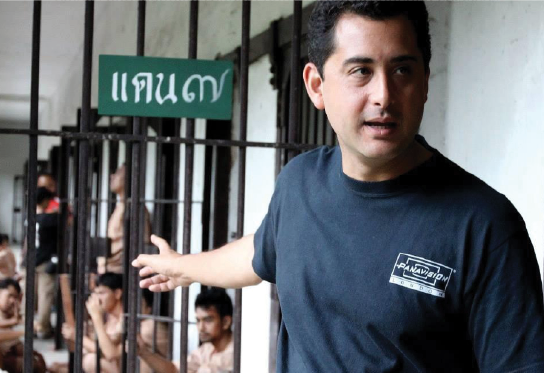
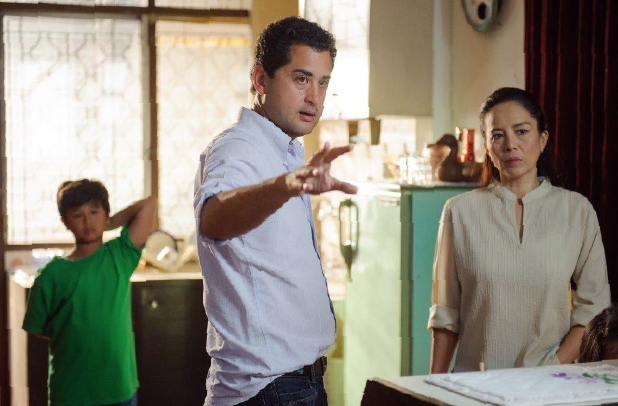
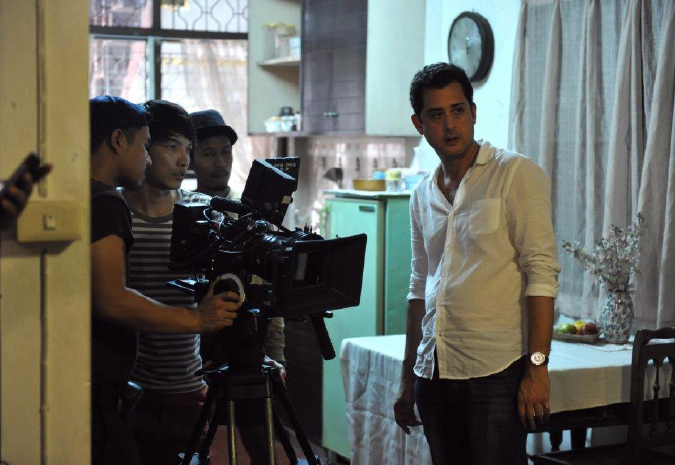
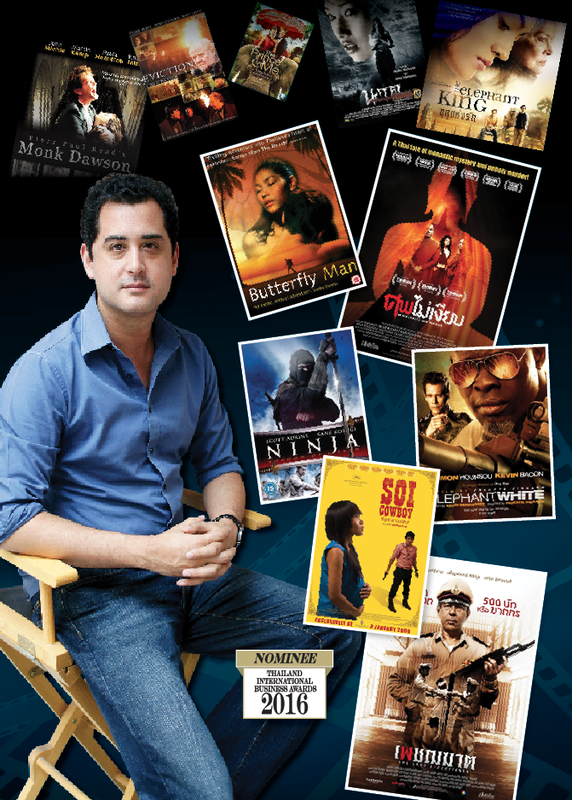
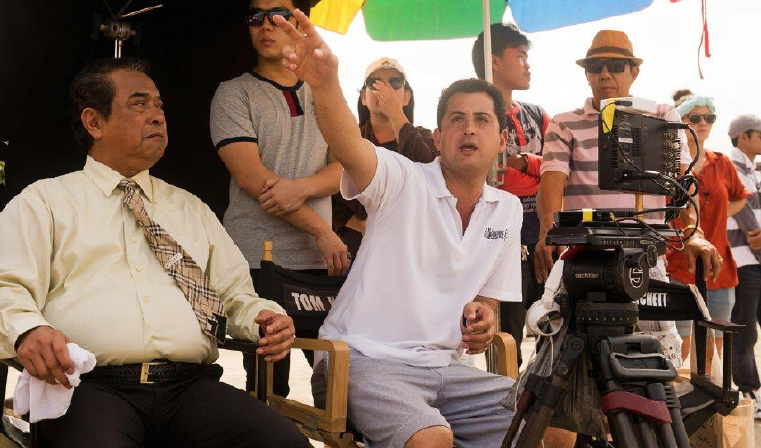
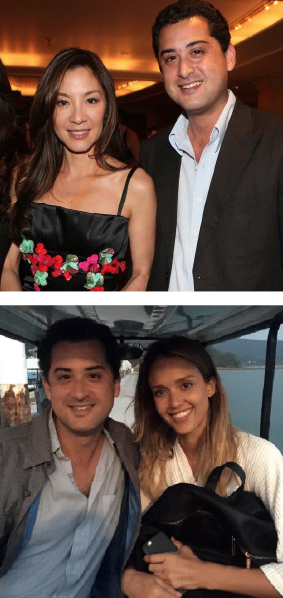
 RSS Feed
RSS Feed



